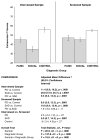A comparison between screened NIMH and clinically interviewed control samples on neuroticism and extraversion
- PMID: 17938631
- PMCID: PMC3000667
- DOI: 10.1038/sj.mp.4002114
A comparison between screened NIMH and clinically interviewed control samples on neuroticism and extraversion
Abstract
The National Institute of Mental Health (NIMH) has supported the collection of DNA samples on over 4000 subjects for use primarily as controls in psychiatric genetic studies. These subjects, though screened online, were not directly interviewed or assessed on family history. We compared this sample to one that was directly interviewed using structured diagnostic assessments on comparable measures of neuroticism and extraversion. The screened sample completed an online self-report based on the Composite International Diagnostic Instrument Short-Form (CIDI-SF). The interviewed sample was assessed by clinically trained personnel using the Schedule for Affective Disorders and Schizophrenia (SADS-LA-IV) and Family History Screen; final diagnoses were made blind to trait scores by a clinician using the best-estimate procedure. Neuroticism and extraversion were assessed on the NEO five-factor inventory (NEO-FFI) and the revised Eysenck Personality Questionnaire short form (EPQ-R). We found that subjects in the NIMH-screened sample who did not report any psychiatric symptoms on the self-report were indistinguishable from interviewed diagnosis free and family history negative controls on neuroticism and extraversion. Subjects in the screened sample who screened positive for anxiety disorders, however, deviated significantly on these measures both from the screened subjects with no self-reported symptoms, as well as from subjects in the interviewed sample diagnosed with comparable disorders. These findings suggest that control groups generated from the NIMH sample should ideally be restricted to subjects free of any self-reported symptoms, regardless of the disorder being addressed, in order to maximize their reflection of diagnosis-free populations.
Figures



References
-
- Kendler KS. ‘A gene for…’: the nature of gene action in psychiatric disorders. Am J Psychiatry. 2005;162:1243–1252. - PubMed
-
- Risch N, Merikangas K. The future of genetic studies of complex human diseases. Science. 1996;273:1516–1517. - PubMed
-
- Genetics and mental disorders. National institute of mental health’s genetics workgroup. Biol Psychiatry. 1999;45:559–573. - PubMed
-
-
National Institute of Mental Health Center for collaborative genetic studies on mental disorders. RFA: MH-03-003. 2002 March 28, 2002.
-
-
- Moldin SO. NIMH human genetics initiative: 2003 update. Am J Psychiatry. 2003;160:621–622. - PubMed
Publication types
MeSH terms
Grants and funding
- MH059571/MH/NIMH NIH HHS/United States
- R01 MH067257/MH/NIMH NIH HHS/United States
- R01 MH060870/MH/NIMH NIH HHS/United States
- R01 MH059587/MH/NIMH NIH HHS/United States
- P01 MH060970/MH/NIMH NIH HHS/United States
- MH059588/MH/NIMH NIH HHS/United States
- R01 MH059566/MH/NIMH NIH HHS/United States
- R01 MH059588/MH/NIMH NIH HHS/United States
- MH59566/MH/NIMH NIH HHS/United States
- MH59587/MH/NIMH NIH HHS/United States
- R01 MH061675/MH/NIMH NIH HHS/United States
- MH061675/MH/NIMH NIH HHS/United States
- MH60870/MH/NIMH NIH HHS/United States
- MH59586/MH/NIMH NIH HHS/United States
- MH067257/MH/NIMH NIH HHS/United States
- P01 MH60970-04/MH/NIMH NIH HHS/United States
- R01 MH059571/MH/NIMH NIH HHS/United States
- R01 MH059565/MH/NIMH NIH HHS/United States
- MH059565/MH/NIMH NIH HHS/United States
- R01 MH059586/MH/NIMH NIH HHS/United States
- U01 MH060879/MH/NIMH NIH HHS/United States
- R01 MH060879/MH/NIMH NIH HHS/United States
LinkOut - more resources
Full Text Sources

